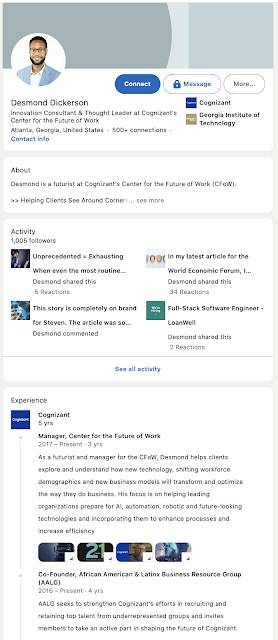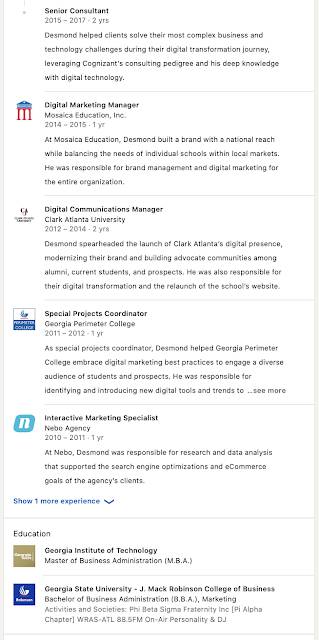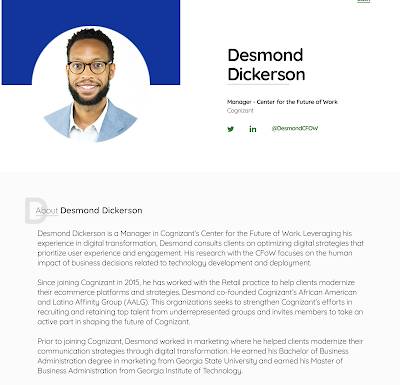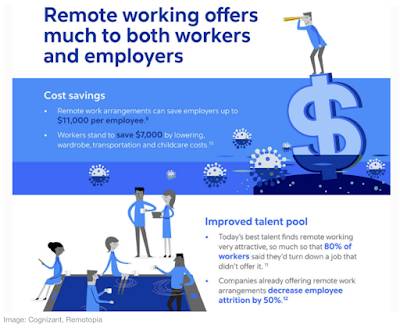The World Economic Forum, our self-appointed global superiors, have outlined what work will look like over the next half decade. Not surprisingly, the WEF's braintrust is using the COVID-19 pandemic as the raison d'être for prompting the changes in how the useless eaters will work for a living. Let's look at some of the highlights of this article by Desmond Dickerson, Manager of the WEF's Center for the Future of Work:
Let's start by looking at the author's qualifications:
You will notice that Mr. Dickerson is also affiliated with Cognizant as the Manager of its Center for the Future of Work. Here is more information on that aspect of Mr. Dickerson:
Dickerson notes that there will be four changes that will define the way that we work five years from now:
1.) Remotopia or working from home (WFH): Dickerson observes that, at the beginning of 2020, less than 5 percent of workers did their jobs remotely. This grew to more than half of "knowledge workers" (a person whose job consists of handling or using information). He goes on to state that companies like Facebook, Google, PayPal and others have announced permanent remote working policies. He claims that studies show that remote employees work longer hours and are more productive than their "in-office" counterparts. Here is a graphic showing the benefits of remote working that appears in his article:
All of that said, as those of us who actually worked for a living know, the vast majority of jobs cannot be done from home. While he notes that Google, PayPal and Facebook have announced a permanent WFH model, these companies make NOTHING (other than profits for their shareholders and wealth for their founders). Most jobs involve the use of equipment that is not found in an average household (i.e. the heavy equipment used in the manufacturing, extraction and construction sectors) and, in some cases, face-to-face collaboration is the only way to "get the job done". In my working career, it was necessary to have input from four different disciplines prior to making a final decision; I can see no way that this interdisciplinary coordination could have taken place in a virtual meeting. As well, the training of new staff, both newly graduated and new to the company) cannot take place while working from home; over the long-term, this will result in poorly trained employees and feelings of isolation among those who are new to a company. So much for the idea of team work.
2.) Blue Collar, White Collar, Green Collar: Of course, given the WEF's fixation with climate change, Dickerson notes that new green business opportunities will arise, particularly as the Biden Administration rejoins the Paris Agreement. This will result in a rise in the number of workers required for the new green businesses. Here is a quote:
"As new regulations and new technologies give way to new platforms and ways of doing business, the workers behind it must evolve. The rise of “green collar” jobs represents great opportunity for job creation and will be a salvation to many workers whose jobs will be eliminated by new policies around industrial carbon cuts or automation.
Over the past decade, digital transformation has turned every company into a tech company. The next decade is likely to see similar transformation in sustainability policies and strategies.
As every business becomes a green business, organizations will need to train green collar workers to combine tech skills with domain-specific training in environmentally-friendly business processes. These green collar jobs will range from solar installation technicians to ESG Directors that manage an organization’s overall portfolio of climate change reduction efforts."
3.) Evolution of the Gig Economy: Here is another quote from Dickerson's article:
"The next COO at your company will work remotely, stay with the company for six months, and never even get a company email account. But they will be the best hire you’ve ever made."
In a recent Forbes article, we find this quote from Ben Huffman, CEO of Contra:
"There is a fundamental shift to project-based employment, tricky at first, but long-term will lead to a renaissance in how we work and enable all of use to achieve greater work-life balance. COVID-19 is an accelerant to a trend that has been long overdue."
What wasn't said by Mr. Huffman was that companies benefit from project-based employment because companies don't have to pay for benefits and pensions and can end workers' contracts whenever they feel like it without the added cost of severance pay. "Better work-life balance" will be achieved but only because workers have absolutely no job security and could easily find themselves suffering from long periods of unemployment.
Now, let's look at a quote from Dickerson's article regarding the "gig economy":
"In years past, freelancing was viewed as a last resort for individuals that struck out in traditional roles or for those that were otherwise undesirable employees. Now, the most talented individuals are betting on themselves.
Freelancing offers agility to companies that must adapt to unexpected challenges and provides freedom to workers who want flexible and remote work arrangements. Embracing this shift positions all parties to succeed in the future of work, no matter where or when that happens.
As the coronavirus pandemic forces a re-think of entrenched work culture norms, the opportunity arises for disruption of professional services via the gig economy. But the tools to move towards a less exploitative and more just platform economy will be essential – with strategies that involve transparency, accountability, worker power and democratic ownership."
"Worker power" and "democratic ownership"? Not going to happen, particularly with temporary employees.
4.) Automation and AI augment the workforce: Dickerson states that much of the conversation around the WEF's Fourth Industrial Revolution pivots around the "importance of so-called knowledge workers". He claims that some manual labour will be eliminated by intelligent machines and that other manual jobs will be augmented by intelligent machines. Here is a quote:
"...previously labour-intensive roles will see more dangerous tasks offloaded to machines. This gives rise to roles like “Man-Machine Teaming Managers” that will analyse business functions to assess the proper mix of human and robotic workflows. This is one of many other roles that will emerge at the intersection of human creativity and machine efficiency."
Here are Dickerson's conclusions:
"The COVID-19 pandemic represents an inflection point that will significantly re-shape the future of work over the next five years – and likely beyond. Understanding the second and third order effects of the pandemic are mind-bending, but key to successfully navigating the future of work.
While it is impossible to predict exactly how each of the trends will play out, leaders should be evaluating the range of possible outcomes and assessing their readiness should any of those scenarios play out.
Change preparedness will determine success for most organizations – separating the losers from the survivors and shining a light on the outright winners. It also offers the opportunity for organizations to shape the future they want rather than simply manage the future that comes."
Given that Mr. Dickerson is writing for the World Economic Forum, it isn't terribly surprising that he emphasizes the importance of technology (automation and artificial intelligence) in the "new Post-COVID-19 workplace" and that he promotes the idea of working from home to "save the planet". That said, from his personal working experiences, we can see that he has led a rather sheltered work life, keeping his hands "clean" and free from any tarnishing that a manual labour job would include, making it difficult for him to see the reality facing hundreds of millions of workers around the world who are trying to cope with their own economic nightmares.
You can publish this article on your website as long as you provide a link back to this page.





Be the first to comment